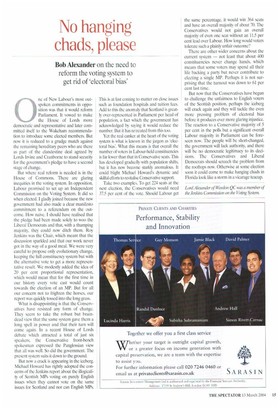N o hanging
chads, please
Bob Alexander on the need to reform the voting system to get rid of 'electoral bias' 0 ne of New Labour's most outspoken commitments in opposition was that it would reform Parliament. It vowed to make the House of Lords more democratic and representative and later committed itself to the Wakeham recommendation to introduce some elected members. But now it is reduced to a grudge match against the remaining hereditary peers who are there as part of the clandestine deal agreed by Lords Irvine and Cranborne to stand security for the government's pledge to have a second stage of change.
But where real reform is needed is in the House of Commons. There are glaring inequities in the voting system. In opposition, Labour promised to set up an Independent Commission on the Voting System. It did so when elected. I gladly joined because the new government had also made a clear manifesto commitment to a referendum on the outcome. How naive. I should have realised that the pledge had been made solely to woo the Liberal Democrats and that, with a thumping majority, they could now ditch them. Roy Jenkins was the Chair, which meant that the discussion sparkled and that our work never got in the way of a good meal. We were very careful to propose only evolutionary change, keeping the full constituency system but with the alternative vote to get a more representative result. We modestly added the idea of 20 per cent proportional representation, which would mean that for the first time in our history every vote cast would count towards the election of an NIP. But for all our concern not to frighten the horses, our report was quickly tossed into the long grass.
What is disappointing is that the Conservatives have resisted any form of change. They seem to take the robust but braindead view that the same system gave them a long spell in power and that their turn will come again. In a recent House of Lords debate which attracted a total of just six speakers, the Conservative front-bench spokesman expressed the Panglossian view that all was well. So did the government. The present system suits it down to the ground.
But now a crack is appearing in the iceberg. Michael Howard has rightly adopted the concerns of the Jenkins report about the illogicality of Scottish MPs voting on purely English issues when they cannot vote on the same issues for Scotland and nor can English MPs. This is at last coming to matter on close issues such as foundation hospitals and tuition fees. Add to this the anomaly that Scotland is greatly over-represented in Parliament per head of population, a fact which the government has acknowledged by saying it would reduce the number. But it has retreated from this too.
Yet the real canker at the heart of the voting system is what is known in the jargon as 'electoral bias'. What this means is that overall the number of voters in Labour-held constituencies is far lower than that in Conservative seats. This has developed gradually with population shifts, but it has now become starkly anomalous. It could blight Michael Howard's dynamic and skilful efforts to revitalise Conservative support.
Take two examples. To get 224 seats at the next election, the Conservatives would need 37.5 per cent of the vote. Should Labour get the same percentage, it would win 364 seats and have an overall majority of about 70. The Conservatives would not gain an overall majority of even one seat without an 115 per cent lead over Labour. How long would voters tolerate such a plainly unfair outcome? There are other wider concerns about the current system — not least that about 400 constituencies never change hands, which means that some voters may spend all their life backing a party but never contribute to electing a single MP. Perhaps it is not surprising that the turnout was down to 61 per cent last time.
But now that the Conservatives have begun to challenge the unfairness to English voters of the Scottish position, perhaps the iceberg will crack again and they will tackle the even more pressing problem of electoral bias before it produces ever more glaring injustice. The reaction to a Conservative majority of 5 per cent in the polls but a significant overall Labour majority in Parliament can be foreseen now. The people will be short-changed, the government will lack authority, and there will be no democratic legitimacy to its decisions. The Conservatives and Liberal Democrats should screech the problem from the rooftops now. Otherwise at some election soon it could come to make hanging chads in Florida look like a storm in a vicarage teacup.
Lord Alexander of Weedon QC was a member of the Jenkins Commission on the Voting System.


































































 Previous page
Previous page